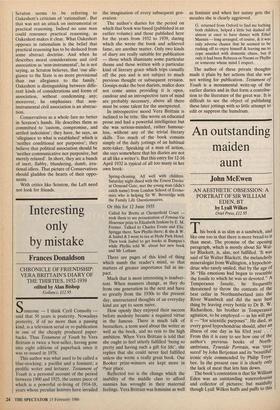Interesting only by mistake
Frances Donaldson
CHRONICLE OF FRIENDSHIP: VERA BRITTAIN'S DIARY OF THE THIRTIES, 1932-1939 edited by Alan Bishop
Gollancz, £12.95
Someone — I think Cyril Connolly — said that 50 years is posterity. Nowadays posterity, if of no more than a passing kind, is a television serial or re-publication in one of the cheaply produced paper- backs. Thus Testament of Youth by Vera Brittain is twice a best-seller, having gone into eight editions of paperback since it was re-issued in 1978.
This author was what used to be called a blue-stocking; a pacifist and a feminist; a prolific writer and lecturer. Testament of Youth is a personal account of the period between 1900 and 1925, the centre piece of which is a powerful re-living of 1914-18, years whose peculiar horrors have invaded the imagination of every subsequent gen- eration.
The author's diaries for the period on which that book was based (published in an earlier volume) and those published here for the years from 1932 to 1939, during which she wrote the book and achieved fame, are another matter. Only two kinds of diary are really suitable for publication — those which illuminate some particular theme and those written with a particular kind of literary grace which trips casually off the pen and is not subject to much previous thought or subsequent revision. Gossips make the best diarists, malice does not come amiss providing it is open, candour and an introspective turn of mind are probably necessary, above all there must be some talent for the unexpected.
In introspective mood Vera Brittain is inclined to be trite. She wrote an educated prose and had a powerful intelligence but she was serious-minded, rather humour- less, without any of the trivial literary skills. Too much of the book consists simply of the daily jottings of an habitual note-taker. Speaking of a man of action, she says somewhere that his diaries are not at all like a writer's. But this entry for 12-16 April 1932 is typical of all too many in her own book:
Spring-cleaning. All well with children. Saturday night dined with the Ernest Davies' at Ormond Gate; met the young man (didn't catch name) from London School of Econo- mics who is helping Sir W. Beveridge with the Family Life Questionnaires.
Or this for 12 June 1935
Called for Bretts at Chesterfield Court — took them to see presentation of Femina-Vie Heureuse prize to Elizabeth Jenkins by E. M. Forster. Talked to Charles Evans and Eliz. Sprigge there. Saw Phyllis there; & she & W. & Isabel & I went to tea at Hyde Park Hotel. Then took Isabel to get books at Bumpus's while Phyllis told W. about her new book and Mr Latham.
There are pages of this kind of thing which numb the reader's mind, so that matters of greater importance fail in im- pact.
Much that is most interesting is inadver- tent. When manners change, as they do from one generation to the next and have so greatly from the 1930s to the present day, unstructured thoughts of an everyday kind are apt to seem naive.
How openly they enjoyed their success before modesty became a required virtue in the famous. There is much talk of bestsellers, a term used about the writer as well as the book, and no rein to the high ambition. When Vera Brittain is told that she ought to feel utterly fulfilled 'being so pretty and having such a gift for life', she replies that she could never feel fulfilled unless she wrote a really great book. Our Booker prize-winners are kept more in their place.
Reflected too is the change which the inability of the middle class to afford nannies has wrought in their maternal feelings. Vera Brittain was feminine as well as feminist and when her nanny gets the measles she is clearly aggrieved.
G. returned from Oxford to find me bathing both children, helped a little but dashed off almost at once to have dinner with Ethel Mannin — long arranged, of course, & it was only adverse chance that he seemed to be rushing off to enjoy himself & leaving me to cope unaided with domestic chaos, but if only it had been Rebecca or Naomi or Phyllis or someone whose mind I respect.
The author of these private thoughts made it plain by her actions that she was not writing for publication. Testament of Youth is a monumental write-up of the earlier diaries and in that form a contribu- tion to the literature of the great war. It is difficult to see the object of publishing these later jottings with so little attempt to edit or suppress the humdrum.





































 Previous page
Previous page